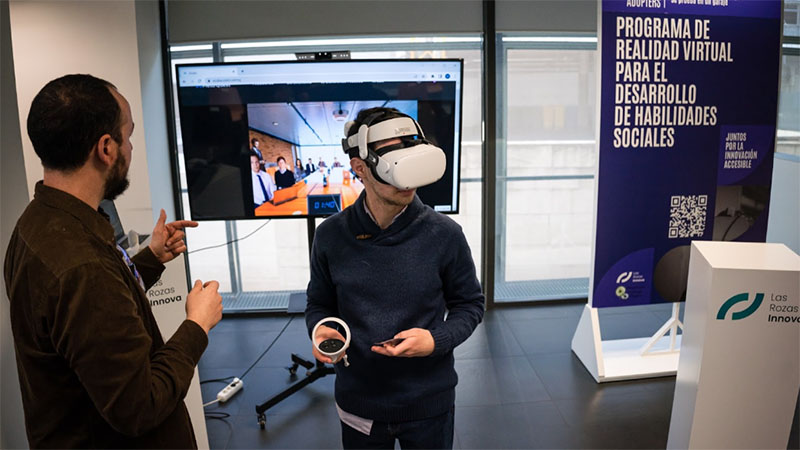Working with the Asociación Asperger Madrid
Discover how Asociación Asperger Madrid empowers individuals with Asperger's to enhance their social skills through VR
Highlights
- VirtualSpeech was used to practice key social interactions in a controlled environment. Activities focused on reducing anxiety and enhancing communication skills.
- Participants showed a remarkable 10% improvement in social skills and anxiety management.
- The program also resulted in a 20% increase in satisfaction and comfort levels among participants.

Customer Introduction
Asociación Asperger Madrid is a nonprofit organization that was granted public utility status in 2011 by both the Community of Madrid and the Madrid City Council. Its mission is to advance the well-being of individuals with Asperger Syndrome, including members and children of members.
This is achieved through a range of welfare, educational, recreational, cultural, and sports activities. The association also promotes, establishes, organizes, or sponsors diagnostic and evaluation centers. The organization operates in three distinct areas, each offering different services:
Clinical Area
- Diagnostic assessments
- Individual therapy sessions
- Family therapy sessions
- Nature therapy
- Music therapy sessions
Work Area
- Information and resource guidance
- Socio-labor integration support
- Personal autonomy and independent living programs
- Leisure and recreational activities
Educational Area
- Social skills workshops
- Internal and external training opportunities
- Educational support services
The Goal
Social skills training is widely recognized as a primary form of support for individuals with Autism Spectrum Disorder (ASD) due to the challenges they face in learning, which directly impacts the quantity and quality of their social relationships, active participation in the social world, and employability.
These individuals often experience difficulties in social competence, characterized by reduced proactivity in initiating social interactions, heightened levels of interaction anxiety, and limited verbal and nonverbal communication skills.
In light of these challenges, an intriguing question arises: Can social skills training in controlled virtual environments prove beneficial in reducing anxiety levels during communication situations for individuals with Asperger syndrome?
The overall goal is to enhance the social competence of individuals diagnosed with Asperger's Syndrome using Virtual Reality (VR) technology. The specific objectives include reducing anxiety levels during social interactions by 5% and increasing the duration of eye contact with the interlocutor by 10%.

The Solution
The project hypothesizes that utilizing controlled virtual environments for exposure to social communication situations can effectively reduce anxiety levels during various stages of interaction.
The VirtualSpeech VR software offers appropriate environments and metrics for such exposure. The primary aim is to create highly interactive and captivating learning experiences by simulating authentic social situations.
This enables individuals with Asperger Syndrome to learn the interpretation and response to social cues, practice eye contact, verbal intonation, facial expressions, and other communication skills within a virtual environment.
Results and Benefits
The initial pilot project commenced in February 2023 and concluded in December 2023. Participants showed a remarkable 10% improvement in their social skills when interacting with strangers, as well as in managing anxiety and panic attacks. The program, focused on improving employability, also resulted in a 20% increase in the feeling of satisfaction and comfort among the individuals who completed it.
The study targeted five participants, aged 20-30 years, who have been diagnosed with Asperger's syndrome or ASD grade 1.

Participants said:
"I thought it was a fantastic experience. I felt like I was leaving an environment that seemed more or less familiar to me and then entering and being placed in another one never seen before within moments of each other."
Question: Do you believe it has the potential to enhance your social and communication skills?
"I believe that it can provide valuable support in improving our ability to interact with others, especially in areas where we may initially feel anxious or apprehensive.
By incorporating alternative methods of communication through virtual environments, it enables us to explore different approaches to conversation without the fear of personal failure that often accompanies direct interactions. Additionally, it offers an opportunity to observe and understand the strategies employed by others in social interactions, allowing us to break down communication barriers more effectively."
Question: Do you believe it should be made available for everyone to experience?
Based on initial tests, I discovered that this technology has the potential to be applied in numerous scenarios: from interview preparations and overcoming stage fright to simulating real-life situations and facilitating educational explanations.
It shouldn't be limited to a specific group of individuals but rather seen as an opportunity for anyone to "prepare" themselves for upcoming situations they may encounter for the first time. The accessibility of this technology should be expanded to benefit a wide range of individuals, as it can offer valuable preparation and support in various aspects of life.
Additional Comments
"In my opinion, the utilization of VirtualSpeech VR has immense potential as a valuable tool for intervention with individuals diagnosed with Asperger's syndrome or ASD. While it should not replace clinical sessions entirely, it serves as a powerful resource for fostering the development of communication and social interaction skills.
Furthermore, it could prove highly beneficial in preparing individuals with ASD for emotionally challenging or difficult situations, such as job interviews, social gatherings with friends, and navigating various social contexts (educational, familial, recreational), where they may encounter unique obstacles."
This project and its remarkable outcomes attracted significant media attention: